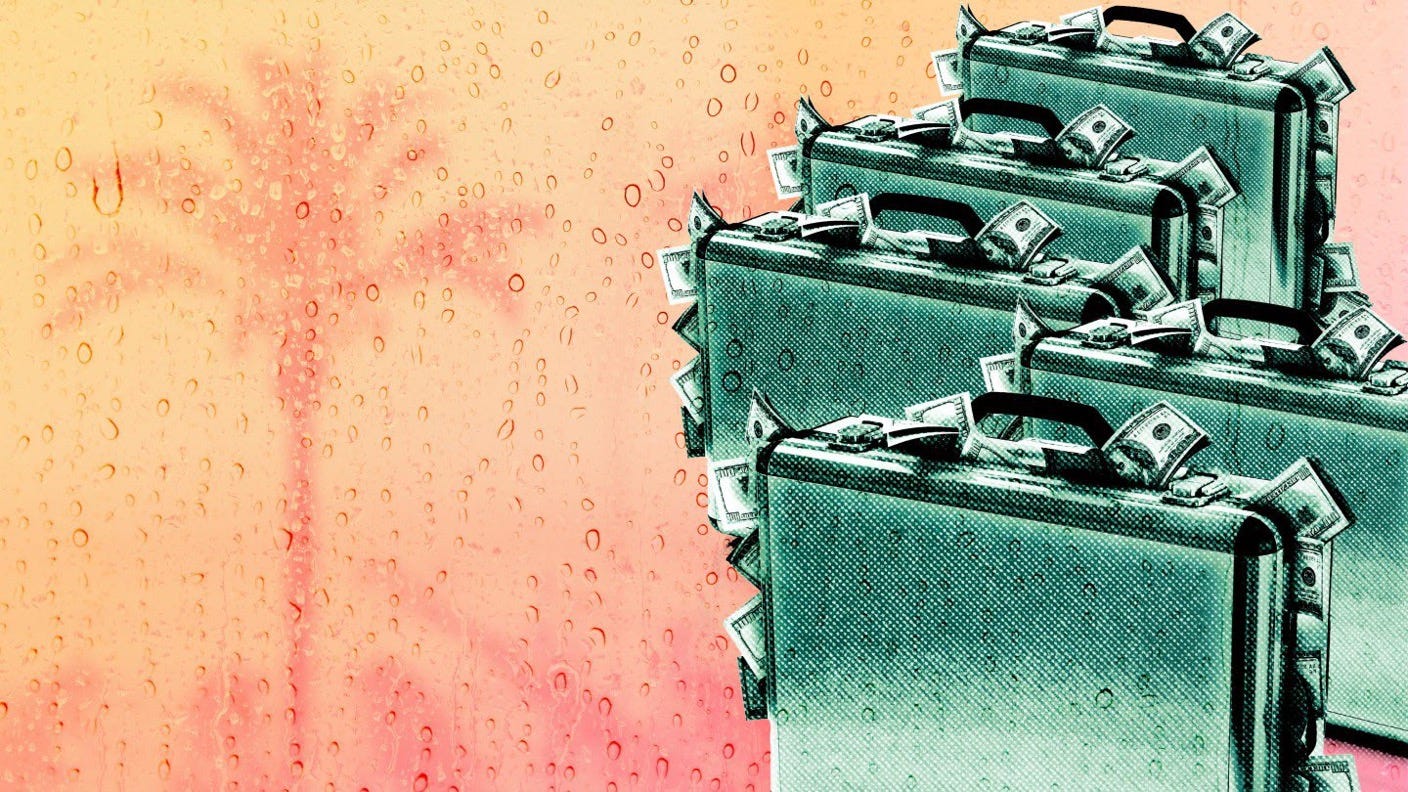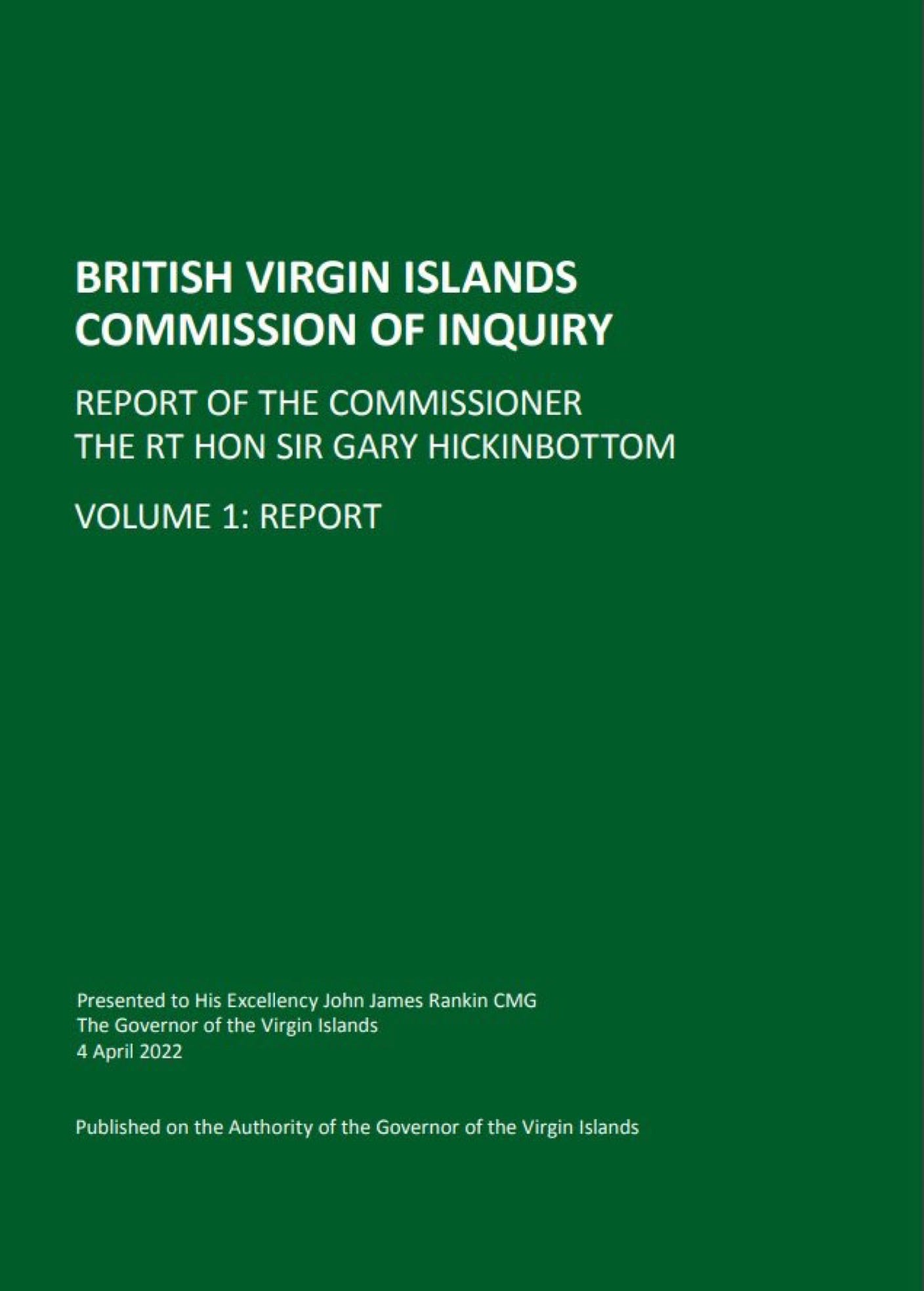British Virgin Islands
The money laundry for criminals, Russians and the Chinese - a deep dive into the controversy of this secretive off-shore haven of crooks.
Time to clean up the British Virgin Islands - another corrupt den of iniquity. Home to a growing number of corrupt shadow companies that fuel corrupt dictatorships the world over.
Geographical and political context:
The British Virgin Islands (BVI), officially the Virgin Islands, are a British Overseas Territory in the Caribbean, to the east of Puerto Rico and the US Virgin Islands and north-west of Anguilla. The islands are geographically part of the Virgin Islands archipelago and are located in the Leeward Islands of the Lesser Antilles and part of the West Indies.
In 1968 the British Government issued a memorandum requiring that the postage stamps in the territory should say "British Virgin Islands" (whereas previously they had simply stated "Virgin Islands"), a practice which is still followed today. The islands gained separate colony status in 1960 and became autonomous in 1967 under the new post of Chief Minister.
The territory operates as a parliamentary democracy. Overseas Territory of the UK with limited self-government; parliamentary democracy. Ultimate executive authority in the British Virgin Islands is vested in the King, and is exercised on his behalf by the Governor of the British Virgin Islands. The governor is appointed by the King on the advice of the British Government. Defence and most foreign affairs remain the responsibility of the United Kingdom.
The twin pillars of the economy are financial services (60%) and tourism (roughly 40-45% of GDP). Economically however, financial services associated with the territory's status as an offshore financial centre are by far the more important. 51.8% of the Government's revenue comes directly from licence fees for offshore companies, and considerable further sums are raised directly or indirectly from payroll taxes relating to salaries paid within the trust industry sector (which tend to be higher on average than those paid in the tourism sector). This is important context for the purpose of the thread.
Other notable information:
👉 Chief of state: King CHARLES III (since 8 September 2022); represented by Governor Daniel PRUCE (since 29 January 2024)
👉 Head of government: Premier Dr. Natalio WHEATLEY (since 5 May 2022)
👉 Cabinet: Executive Council appointed by the governor from members of the House of Assembly
👉 Elections/appointments: the monarchy is hereditary; governor appointed by the monarch; following legislative elections, the leader of the majority party or majority coalition usually appointed premier by the governor
💥 Note; on 5 May 2022, Premier Andrew FAHIE was removed from office by a no confidence vote in House of Assembly following his arrest on drug trafficking and money laundering charges on 28 April 2022; Premier Dr. Natalio WHEATLEY sworn in as premier on 5 May 2022
Financial services
Financial services account for over half of the income of the territory. The majority of this revenue is generated by the licensing of offshore companies and related services. The British Virgin Islands is a significant global player in the offshore financial services industry. Since 2001, financial services in the British Virgin Islands have been regulated by the independent Financial Services Commission.
The BVI Financial Services Commission is an autonomous regulatory authority responsible for the regulation, supervision and inspection of all the British Virgin Islands financial services including insurance, banking, trustee business, company management, mutual funds business, the registration of companies, limited partnerships and intellectual property. It was established in 2001 pursuant to the Financial Services Commission Act, 2001.
The commission now oversees all regulatory responsibilities previously handled by the government through its Financial Services Department; protecting the independence of financial services regulation and fulfilling international commitments to the prevention of international white collar crime while safeguarding the privacy and confidentiality of legitimate business transactions. The commission also has new responsibilities including promoting public understanding of the financial system and its products, policing the perimeter of regulated activity, reducing financial crime and preventing market abuse.
The Chairman of the Board of Commissioners is Mr Robin Gaul, who qualified as an accountant in the United Kingdom in 1967, was a partner of KPMG and had served on various boards and committees in the BVI public sector including the Development Bank of the Virgin Islands and the BVI Electricity Corporation. Mr Gaul was appointed as Deputy Chairman of the Inaugural Board of the Financial Services Commission in 2002 and chairman of the board in May, 2006.
Colin O'Neal is the Deputy Chairman. He was admitted as a barrister in the British Virgin Islands in 1987 and was the founder and managing partner of the law firm O'Neal Webster where he practiced commercial law for nearly twenty years. He is a member of the BVI Bar Association, Associate Member of the American Bar Association and member of the Urban Land Institute.
Robert Mathavious is the Managing Director/CEO. He was appointed the first Managing Director and Chief Executive Officer of the Financial Services Commission in 2002.
Right - with the context in place, let’s look at what the problem is that I am calling out: The murky world of corrupt financial services - a hub for international criminal networks and dictatorships, including Russia and China. The economy is based on secrecy and low taxes is a recipe for bad governance, corruption, and criminality.
In 2021, the International Consortium of Investigative Journalists exposed the depth of the problem in a report titled “British Virgin Islands corruption scandal threatens its dependable tax haven reputation” The territory, whose shell companies have repeatedly played a role in notorious global crime schemes, also may be blacklisted by the EU after the Brexit deal.
A corruption scandal exposed in the report threatened to upend the territory’s reputation as one of the world’s most dependable tax havens. That is code speak for a den of financial vice and corruption. They announced a commission of inquiry to investigate allegations of corruption and the misuse of millions of dollars in public funds. The inquiry (was) backed by the United Kingdom, which oversees the BVI as an overseas territory. The BVI governs its domestic affairs and raises its own taxes but relies on the United Kingdom for defense and diplomatic matters.
“A consistent and deeply troubling array of concerns have been put to the Governor by local institutions and the community,” the then U.K. foreign secretary, Dominic Raab, said in a statement to parliament. “We cannot ignore such serious allegations.”
The BVI is one of the world’s most popular tax havens and attracts legitimate business corporations, celebrities, multimillionaires, and criminals alike. The island offers cheap and simple shell companies that allow their owners to avoid registering their names in public. While owning and piping money through BVI companies is legal, shell companies created on the island are a regular feature in the world’s most notorious scandals. BVI companies appeared in a $2 billion scheme in the name of a close friend of Russian President Vladimir Putin and the “corruption pact” that last week saw Israeli tycoon, Beny Steinmetz, sentenced to jail.
More than half of the shell companies exposed in the Panama Papers investigation were registered in the BVI, according to an analysis by the International Consortium of Investigative Journalists. The ICIJ also revealed as part of the FinCEN Files investigation that BVI companies appeared in one in every five suspicious activity reports filed by banks that had concerns about possible money laundering.
Responding to pressure and sustained scandals that highlighted the role of BVI shell companies in global crime, the island agreed to introduce a public register of company owners. Following the United Kingdom’s exit from the European Union, pressure from European members of parliament has grown to add the BVI back to the continent’s tax haven blacklist. Previously, the U.K. had lobbied to keep its overseas territories off such a list.
In October 2020 - Transparency International wrote an article saying “The British Virgin Islands (BVI) has just announced that it would join the rest of the British Overseas Territories, as well as the Crown Dependencies of Jersey, Guernsey and the Isle of Man, in committing to publish the names of those who own companies registered there. For a jurisdiction that has for so long used secretive company ownership to attract investment, this was a major step. Yet the statement was not as positive as it could have been.
The announcement suggested the BVI still have major reservations about corporate transparency. Andrew Fahie, the Premier of the territory, called public company ownership registers ‘disproportionate’ and suggested they could do more harm than good, citing concerns over privacy and kidnapping. That certainly hasn’t been the experience in Britain since the UK Government introduced its own public register.”
It seems that there are registers that are simply superficial, with no attempts to link named people and organisations to crime or state actors.
Research by Transparency International UK has shown that the opacity of companies in the BVI is a major draw to international criminals and money launderers. In 2018, we found 1,107 BVI companies involved in 213 corruption cases amounting to hundreds of billions of pounds worth of funds diverted by rigged procurement, bribery, embezzlement and the unlawful acquisition of state assets. The more the BVI drags its feet in implementing new global standards of corporate transparency, the more it looks like it has something serious to hide. This is why it is vitally important that the UK Government sets out a timetable for all of its overseas jurisdictions to ensure transparency measures are brought in, no later than the 2023 deadline.
The information on these public company registers should be accurate, free to access and easy to analyse, as is the case here in the UK. Such features will ensure global law enforcement, the private sector as well as civil society can make full use of them in detecting and stopping financial crime, ending the suffering which financial secrecy plays a key role in facilitating.
On January 18, 2021, the British government made a surprise announcement that they were convening an independent commission to investigate corruption, organized crime, and other governance failures in the British Virgin Islands. BVI is infamous for its shell companies, lax oversight, generous tax policies, and general friendliness to those seeking to evade taxes—legally or otherwise. It has also become the known site of some serious criminal allegations, including a $300 million cocaine ring that involved local police officers. As exposed in the Panama Papers and other leaks, BVI is the jurisdiction of choice for many nefarious activities.
The British government’s decision to crack down now comes amid a global wave of new sunshine laws meant to combat the moving of dark money. In the US as of this month, a new beneficial owner registry and a new anti-money laundering whistleblower program both will do a lot to stop the secretive movement of money. The UK similarly mandated the publication of beneficial ownership information in the last few years. Even the infamously secretive Switzerland recently mandated the disclosure of beneficial owner names.
The European Union’s concerns:
According to the International Consortium of Investigative Journalists (ICIJ), more than half of the shell companies exposed in the Panama Papers investigation were registered in the BVI. More recently, as part of the FinCEN Files investigation, the ICIJ reported that BVI companies have appeared in one in every five suspicious activity reports filed by banks with concerns about possible money laundering.
Back in 2020, the EU had a committee led by Dutchman Paul Tang - who’s claim to fame was they would represent the peoples voice (of the EU), in naming and shaming both EU and non-EU tax havens, costing the Union of=ver €40 Billion a year in tax revenues. In a resolution adopted in January 2021, Parliament recalled the urgent need to update the EU list of tax havens. This comprises a blacklist of just 12 jurisdictions and a greylist of nine. Interestingly, the BVI is not on either list.
2022 - BRITISH VIRGIN ISLANDS - COMMISSION OF INQUIRY
REPORT OF THE COMMISSIONER - THE RT HON SIR GARY HICKINBOTTOM
“Under section 2 of the Commissions of Inquiry Act 1880 (Chapter 237 of the Revised Laws of the Virgin Islands) and in an instrument dated 19 January 2021, your predecessor in the office of Governor, His Excellency Augustus Jaspert, appointed me as sole Commissioner in respect of a full, faithful and impartial inquiry into whether there was information that corruption, abuse of office or other serious dishonesty in relation to officials, whether statutory, elected or public, may have taken place in recent years; if there were such information, to consider the conditions which allowed such conduct to take place and whether they may still exist; and, if appropriate, to make independent recommendations with a view to improving the standards of governance and the operation of the agencies of law enforcement and justice in the Territory.”
The report findings:
“With limited exceptions, in terms of governance (i.e. how government makes and implements decisions), the people of the BVI have been badly served in recent years. Very badly indeed. Almost everywhere, the principles of good governance, such as openness, transparency and even the rule of law, are ignored. In many important areas of government – including the procurement of contracts, grants of assistance, appointments to statutory boards, the disposal of Crown Land and the grant of residence and belonger status – discretionary decisions are made by elected officials (usually, Ministers) on the basis of no criteria, or patently inadequate and/or unpublished criteria, or criteria which are as often as not simply ignored. They can and do make decisions – which expend huge sums of public money and affect the lives of all those who live in the BVI – as they wish, without applying any objective criteria, without giving any reasons and without fearing any comeback.
The relevant elected officials are well aware of this chronic lack of governance. The Auditor General and Director of the Internal Audit Department, whose job it is to audit government accounts and government projects, have consistently reported on these failures, indicated the dishonesty to which they might give rise and which they might obscure, and identified what needs to be done to prevent their reoccurrence. These auditors have been brave, forthright and clear in both their criticisms and their recommendations. But they have been consistently ignored.
Other constitutional pillars of governance, such as the Registrar of Interests, have been treated will similar disdain. Not only has there been a wholesale failure on the part of individual Members of the House of Assembly to make declarations of interests, there has also been a quite deliberate refusal over the last two decades to set up any functional mechanism for the registration of such interests or enforcement of the obligation to make declarations as required by the Constitution and supporting BVI legislation.
The parlous failings in governance identified have not only been allowed by successive informed BVI Governments, but there is evidence that they have been positively endorsed and even encouraged. I have concluded that the elected BVI Government, in successive administrations (including the current administration), has deliberately sought to avoid good governance by not putting processes in place and, where such processes are in place, by by- passing or ignoring them as and when they wish – which is regrettably often. That is all extremely troubling. Such a lack of accountability means that there is a void where governance procedures, checks and balances should be – procedures, checks and balances needed to prevent decision making being infected by factors other than the public interest, including dishonesty on the part of elected officials and or those who might benefit from the decisions they make.”
The 4 recommendations of the report included;
1. A temporary suspension of those parts of the Constitution by which areas of government are assigned to elected representatives. The suspension should be as short as possible to enable principled elected government to be restored.
2. A Constitutional Review is also essential, with the aim of ensuring that mechanisms are put in place so that abuses which cannot continue or be repeated,
3. Many government decisions are made, not openly and transparently on the basis of objective criteria, but using an open-ended power involving unfettered and unmonitored discretion, there should be a review of such powers, with a view to curtailment and replacing them with decisions made in accordance with the principles of good governance.
4. A proper, independent and impartial audit should be undertaken in relation to several areas of government decision making and expenditure
So where are we today?
It seems the British Government, the BVI local government and the Board of Commissioners are all complicit for failing to root out the vice of tax scams conducted through the shady and criminal enterprise of shell companies and tax incentives. They are by definition part of the problem, and not the solution. Evidence has emerged of ongoing links to multiple avoidance schemes by criminals that were left unchallenged and kept hidden from the world - under the government rug and paid BVI civil service.
The Wire China published a report on July 21, 2024 - entitled “The Billionaire Criminal Who Secretly Profited Off Jack Ma’s Deals. Confidential documents show that Xiao Jianhua, a corrupt investor tied to China’s political elite, backed the country’s most successful and revered entrepreneur.”
The investigation concerned the financial backing of Jack Ma, who was the embodiment of China’s spectacular economic rise. Already the country’s wealthiest and most famous businessman, he was poised to become one of the richest in the world. The investigation also concerned links to Xiao Jianhua who then, was also languishing in detention on bribery and corruption charges — a larger-than-life target of a government crackdown on graft. Xiao had amassed a fortune manipulating markets and cultivating close ties to relatives of top Chinese officials, and he was about to be made an example.
Mr. Xiao’s specialty was helping influential officials and their relatives transfer wealth abroad and buy and sell assets; in at least one case, he did so for one of President Xi Jinping’s sisters. See the references for the link to this investigation.
What is concerning is this ties back to the simple fact that the British Virgin Islands remain a den of secret financial iniquity - a harbour and financial hub that the British Government has failed to tackle and clean out under the last ruling party. Now it is time for Keir Starmer to stamp out the financial vice and corruption once and for all. The BVI is one of many financial tax havens helping to fuel both Chinese and Russian money laundering.
Crack on Labour Government - don’t say you knew nothing about this when we hold you to account.
References and sources:
https://www.britannica.com/place/British-Virgin-Islands
https://www.cia.gov/the-world-factbook/countries/british-virgin-islands/
http://www.bvifsc.vg/en-gb/aboutus/governance/boardofcommissioners.aspx
https://en.m.wikipedia.org/wiki/British_Virgin_Islands_Financial_Services_Commission
https://www.icij.org/investigations/paradise-papers/british-virgin-islands-corruption-scandal-threatens-its-dependable-tax-haven-reputation/
https://constantinecannon.com/whistleblower/whistleblower-insider-blog/corruption-crackdown-in-british-virgin-islands/
https://x.com/eliotcxchen/status/1815010578164818140?s=61
https://www.thewirechina.com/2024/07/21/the-billionaire-criminal-who-secretly-profited-off-jack-mas-deals-jack-ma-xiao-jianhua/
https://www.transparency.org.uk/bvi-british-virgin-islands-against-money-laundering
https://assets.publishing.service.gov.uk/media/6297797c8fa8f503978288f9/British-Virgin-Isles-Commission-of-Inquiry-Report.pdf
For my visually impaired supporters, here is an audio narration of this deep dive into their👇
https://trinitymedia.ai/player/share/79c2ef930b2b4e55f7f521c3bdc86b9b5ece














This British Overseas Territory relies on its somewhat murky financial services industry as it accounts for over 50% of the island's revenue stream. The UK government needs to address this sooner rather than later